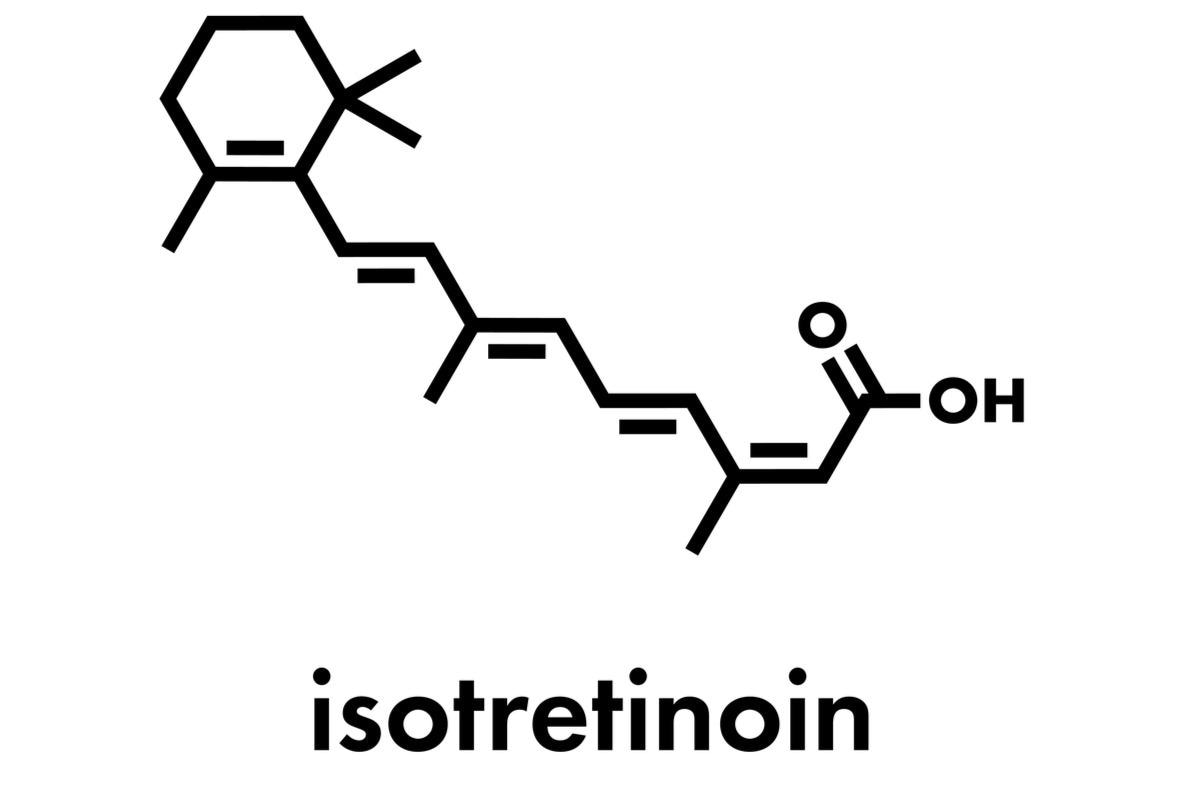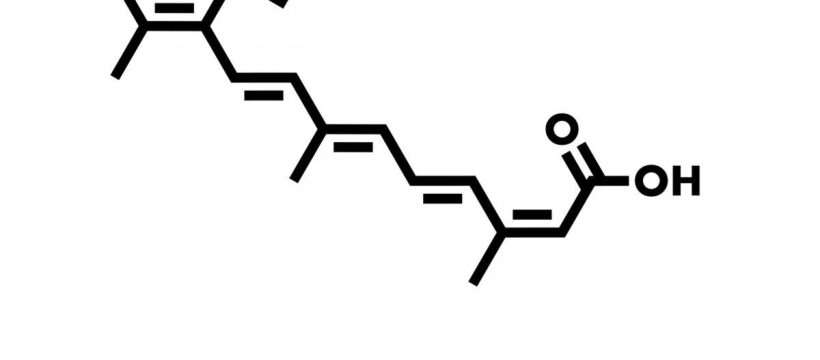In a recent study posted to the medRxiv* pre-print server, researchers evaluated the effectiveness of isotretinoin (13-cis retinoic acid) in improving coronavirus disease 2019 (COVID-19) outcomes.

Severe acute respiratory syndrome coronavirus 2 (SARS-CoV-2) infections have surged rapidly across the globe owing to the emergence of recombinant mutant variants. These variants have demonstrated enhanced viral spike (S) protein and angiotensin-converting enzyme 2(ACE2) binding, which increases viral transmissibility.
Previous studies have reported that the receptor-binding domain (RBD) of S protein strongly binds to the STRA6 (retinol/Vitamin A) receptors. To this end, isotretinoin efficiently downregulates ACE2 receptors. Moreover, it has potent anti-inflammatory property that facilitates improvement in COVID-19 patients by reducing the ‘cytokine-storm’ associated with elevated interleukin-6 (IL-6) in COVID-19.
About the study
In the present study, researchers conducted a randomized controlled trial (RCT) to evaluate the efficacy of isotretinoin in improving COVID-19 outcomes.
A total of 40 hospitalized COVID-19 patients, aged above 18 years, were recruited for the study. They were admitted for less than two days post COVID-19 diagnosis. Data were obtained on the patients’ medical history, age, sex, body mass index (BMI); and radiological and laboratory investigations such as computed tomography (CT) and complete blood picture, respectively.
The subjects were clinically examined for the presence of COVID-19-associated signs and symptoms such as fever, cough, anosmia, abdominal pain, diarrhea, and their oxygen saturation was measured. COVID-19 diagnosis was confirmed by polymerase chain reaction (PCR) and absolute lymphocyte counts below 1.0x 109/L. The severity of the disease severity was categorized as mild, moderate, and severe based on the presence of upper respiratory tract complications and the need for oxygen supplementation, mechanical ventilation, and intensive care unit (ICU) admissions.
The study participants were divided into two groups of 20 patients each. Group I received aerosolized and oral forms of isotretinoin with standard therapy whereas Group II received standard therapy only (control group). The treatment duration was two weeks for both groups. Group I received isotretinoin orally as 20 mg/day doses and as inhaled aerosolized sprays with concentrations ranging from 0.2 to 4 mg/kg/day. The standard of care therapy established by the Egyptian Ministry of Health (MOH) was provided to all patients.
The clinical outcomes assessed were mortality, number of days required for clinical improvement and hospital discharge, ICU admissions, and oxygen saturation levels. The serological outcomes evaluated were IL-6, D-dimer, ferritin, C-reactive protein (CRP), dihydrotestosterone (DHT), tumor necrosis factor-alpha (TNF-α), cholesterol, and immunoglobulin A (IgA).
Results
The study findings showed a high statistically significant difference between the two groups two weeks post-therapy with higher efficacy in Group I.
On clinical examination, the patients presented with persistent fever (26%), intermittent fever (37%), cough (69%), anosmia (32%), and abdominal pain (22%). The oxygen saturation levels ranged between 90 and 95, 90 and 85, and below 85 for 52.6%, 16%, and 31.6% patients, respectively.
On radiological examination, the CT chest scans revealed normal tissue, ground-glass opacification, confluent opacities, consolidation and extensive consolidation in 31.6%,21.1%, 15.5%, 15.8%, and 15.7% patients, respectively.
Only 10.5% of Group I patients required ICU admissions compared to 28.6% controls. Additionally, no deaths were reported in Group I whereas Group II demonstrated 14% mortality. The mortality rate was significantly associated with comorbidities such as obesity and diabetes mellitus. Moreover, patients with abdominal pain and low oxygen saturation were more likely to die due to COVID-19. This indicated that isotretinoin treatment was associated with decreased COVID-19 severity.
In Group I, the time taken to obtain a negative PCR report was 13 days compared to 24 days in Group II. Likewise, Group I patients showed clinical improvement in 16 days and received hospital discharge in 22 days whereas Group II patients improved clinically in 25 days and received hospital discharge in 33 days. This indicated faster clinical improvement with isotretinoin therapy.
Compared with controls, Group I had higher TNF-α and reduced IL-6 and angiotensin II levels. In both groups, IgA, cholesterol, and lymphocyte count increased whereas thrombin, ferritin, CRP, DHT, and soluble ACE2 levels decreased. However, the changes were significant in Group I only. Of these parameters, D-dimer, DHT, ferritin, and CRP values most significantly correlated with COVID-19 mortality.
Conclusion
To summarize, isotretinoin demonstrated promising effects in improving COVID-19-associated morbidity and mortality. Notably, COVID-19 severity was higher in obese and diabetic patients and was associated with changes in D-dimer, DHT, ferritin, and CRP levels. Thus, these parameters could be considered important markers of COVID-19 severity.
*Important notice
medRxiv publishes preliminary scientific reports that are not peer-reviewed and, therefore, should not be regarded as conclusive, guide clinical practice/health-related behavior, or treated as established information.
- Mahmoud Elkazzaz, Yousry Esam-Eldin Abo-Amer, Amr Ahmed and Tamer Haydara. (2022). 13 cis retinoic acid improved the outcomes of COVID-19 patients. A randomized clinical trial. medRxiv doi: https://doi.org/10.1101/2022.03.05.2227195 https://www.medrxiv.org/content/10.1101/2022.03.05.22271959v1
Posted in: Medical Research News | Medical Condition News | Disease/Infection News
Tags: Abdominal Pain, ACE2, Angiotensin, Angiotensin-Converting Enzyme 2, Anosmia, Anti-Inflammatory, Blood, Body Mass Index, Cholesterol, Computed Tomography, Coronavirus, Coronavirus Disease COVID-19, Cough, covid-19, C-Reactive Protein, CT, Cytokine, D-dimer, Diabetes, Diabetes Mellitus, Diarrhea, Dihydrotestosterone, Efficacy, Enzyme, Fever, Hospital, Immunoglobulin, Intensive Care, Interleukin, Interleukin-6, Laboratory, Lymphocyte, Mortality, Necrosis, Obesity, Oxygen, Pain, Polymerase, Polymerase Chain Reaction, Protein, Receptor, Respiratory, Retinoic Acid, Retinol, SARS, SARS-CoV-2, Severe Acute Respiratory, Severe Acute Respiratory Syndrome, Syndrome, Tomography, Tumor, Tumor Necrosis Factor, Vitamin A

Written by
Pooja Toshniwal Paharia
Dr. based clinical-radiological diagnosis and management of oral lesions and conditions and associated maxillofacial disorders.
Source: Read Full Article
